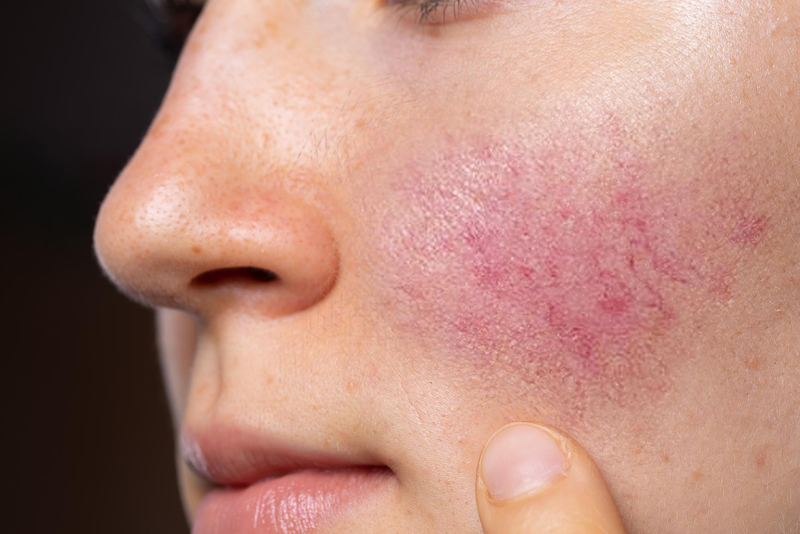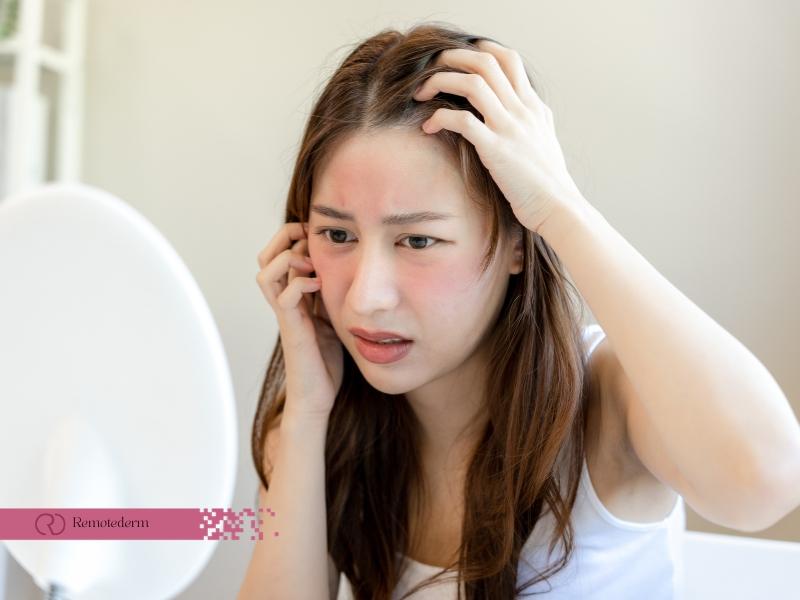Rosacea is a skin condition that affects millions of people worldwide, causing redness, visible blood vessels, and often small, red, pus-filled bumps on the face. While the exact cause of rosacea remains unknown, growing evidence suggests a significant connection between rosacea and stress. This comprehensive article delves into the intricate relationship between these two factors, exploring how stress can trigger and exacerbate rosacea symptoms.
What is Rosacea?
Rosacea is a chronic skin condition that mostly affects the face. Usually, the central regions of the face—the cheeks, nose, forehead, and chin—show signs of redness. Rosacea can occasionally result in additional eye issues like redness, dryness, and irritation. Since the exact cause of rosacea is still unknown, effective management of the condition can be difficult.
Recognizing Rosacea Symptoms
Recognizing the symptoms of rosacea can be pivotal in obtaining timely treatment and managing flare-ups. These symptoms typically manifest as visible changes to one’s complexion, primarily affecting the central region of the face.
- Persistent redness resembling a blush or sunburn that does not fade
- Small, red, pus-filled bumps or pimples
- Visible blood vessels (spider veins) on the nose and cheeks
- Thickening skin, particularly around the nose area (more common in men)
- Dry, itchy, and irritated eyes and swollen eyelids
Individuals must monitor their skin for these signs, as they are prone to come and go, often mistaken for other conditions. If these symptoms persist, consulting a healthcare professional is advisable to discuss potential treatments and strategies to alleviate discomfort. A proactive approach to identifying these signs can lead to more effective management and reduce the likelihood of exacerbation.

Stress and Rosacea: Unraveling the Connection
The intricate link between emotional well-being and skin health is epitomized in the relationship between stress and rosacea. Delving into this connection offers insight into the potential triggers and the management of this skin condition.
Can Stress Cause Rosacea?
Research suggests a strong correlation between stress and the onset of rosacea symptoms. Stress affects the immune system and may trigger inflammatory responses, potentially leading to the worsening of skin conditions like rosacea. Managing stress becomes imperative for those seeking relief from rosacea symptoms.
The Role of Stress as a Trigger
While stress might not directly cause rosacea, it can act as a trigger, intensifying existing symptoms. Stressful situations and chronic stressors can elevate cortisol levels, impacting the immune system and potentially worsening inflammation associated with rosacea. Understanding stress management techniques is crucial for individuals dealing with rosacea.
Strategies for Stress Management and Rosacea Relief
Embarking on the journey of stress management can significantly improve the well-being of individuals with rosacea. Below, we explore practical strategies that can be seamlessly integrated into daily life for easing the toll of stress on the skin.
- Mindfulness Meditation
Embracing mindfulness meditation can help individuals manage stress effectively. By focusing on the present moment, meditation aids in reducing anxiety and promoting overall well-being, potentially alleviating rosacea symptoms.
- Deep Breathing Exercises
Practicing deep breathing exercises helps regulate the autonomic nervous system, reducing stress and promoting relaxation. Incorporating these exercises into a daily routine may contribute to improved rosacea management.

- Consulting Professionals
Consulting professionals for health concerns ensure informed decisions and tailored management plans. When dealing with conditions like rosacea, dermatologists offer expert guidance on treatment options that suit individual needs. The rise of telehealth has made online rosacea treatment an accessible choice for those seeking specialized care from the comfort of their own homes. This virtual avenue broadens access to professional advice and provides a platform for continuous support and monitoring.
Rosacea Skincare: Nurturing Your Skin
Forging a proper rosacea skincare routine that respects the unique needs of rosacea-prone skin is a foundational step toward managing the condition. The following guidelines focus on nurturing and protecting the skin, crucial components of a comprehensive skincare regimen for rosacea.
Gentle Cleansing
For individuals with rosacea, selecting a mild, fragrance-free cleanser is a critical choice in their daily skincare routine. It’s crucial to find a product that is designed to be gentle on hypersensitive skin to avoid exacerbating the condition. Gently cleansing the face with lukewarm water twice daily in a circular, non-abrasive motion can help remove dirt, excess oil, and makeup while maintaining the skin’s delicate balance. This simple yet effective step can significantly reduce the potential for irritation and ensure that the skin is prepped for further rosacea care treatments.
Sun Protection
Sun protection is indispensable to managing rosacea, as ultraviolet radiation can prompt flare-ups and further damage sensitive skin. Utilizing a broad-spectrum sunscreen that offers SPF 30 or higher becomes more than a preventative measure; it serves as a daily shield to fend off the sun’s intense rays. Applying a generous amount of sunscreen each morning and reapplying throughout the day, especially after sweating or swimming, can help to manage rosacea’s symptoms and avert new outbreaks, contributing to the skin’s overall health and appearance.
Moisturization
Rosacea-prone skin can often feel tight, dry, and uncomfortable, making moisturization a key element in skincare. It is essential to choose a moisturizer that is hypoallergenic and non-comedogenic to prevent it from contributing to pore congestion or irritation. An effective moisturizer for rosacea should not only hydrate but also contain ingredients that strengthen the skin’s barrier, calm inflammation, and restore balance. Applying such a moisturizer can aid in locking in moisture, reducing redness, and creating a protective layer against environmental factors that could worsen rosacea symptoms.
Final Thoughts
In conclusion, the journey through understanding the complex dynamics between stress and rosacea underscores the importance of holistic health management. Recognizing the signs of rosacea and acknowledging the profound influence of stress on our skin are the first steps towards fostering a harmonious relationship with our bodies. As research continues to unravel the layers of this connection, it is clear that a blend of mindful stress reduction, professional guidance, and conscientious skincare is key to not just managing but living well with rosacea. Embracing these multifaceted strategies offers hope and empowerment to those affected, paving the way for a calmer, clearer complexion and an improved quality of life.
FAQs
- Can weather changes affect Rosacea’s stress levels?
Extreme temperature changes can worsen rosacea by stressing the body, necessitating skincare adaptable to climate shifts and stress control.
- Is there a connection between diet and rosacea stress?
Certain foods and drinks, like spicy items, alcohol, and hot beverages, can trigger rosacea and increase stress-induced inflammation, making avoidance crucial for those with the condition.
- How does exercise impact rosacea stress?
Regular exercise is good for health but may cause rosacea flare-ups from heat and stress. Opt for low-intensity workouts and keep cool to protect the skin.
- Can rosacea stress affect sleep quality?
Stress affects sleep and can worsen with rosacea-related discomfort. A calming bedtime routine and soothing skin can help enhance sleep.
